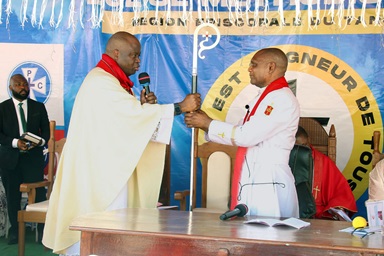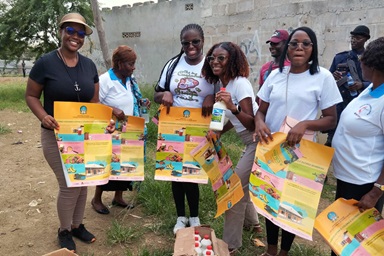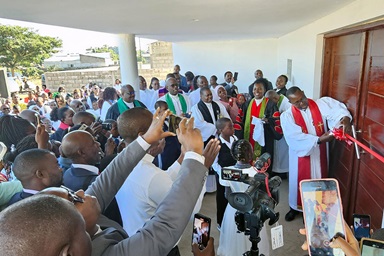Key points:
- Over 600 Methodist women from Southern and East Africa marched in solidarity with survivors of gender-based violence and those suffering in silence.
- The issue dominated conversations when women from the World Federation of Methodist and Uniting Church Women gathered in Botswana’s capital April 3-6 for their quinquennial seminar.
- Speakers at the gathering shared sobering numbers and noted that Africa has few shelters for survivors. The majority seek refuge in churches.
The Rev. Neusa Ndalamba said she was always scared of her father while she was growing up. Being the eldest of seven children, she witnessed how he mistreated her mother.
“It was mainly psychological abuse, but he sometimes abused our mother physically, and my siblings and I are still healing from the childhood trauma. My mother was quiet; she suffered in silence,” said the 43-year-old United Methodist pastor and Angola’s Kwanza Norte District superintendent.
“At one time I decided I would not get married as I thought all men were like my father. It was only after attending university and meeting people from different countries that I changed my perception of men. My husband is from a different country and he has Christian values, loves and cares for me and our children,” she said.
Fozia Madjoe, 58, a member of the Methodist Church of Southern Africa, described a typical cycle of abuse. Her first husband ensured she had no friends, was isolated from family and would then physically abuse her. There would be some “honeymoon” phases when he would apologize and pretend all was well in their marriage.
Madjoe bears a scar on her face from an incident when her former husband hit her with a baseball bat.
“He struck me with the bat and I was torn open from my brow to below the eye. Life with him was humiliating, degrading and I would get a beating for anything and everything,” she said.
She eventually divorced him and has remarried.
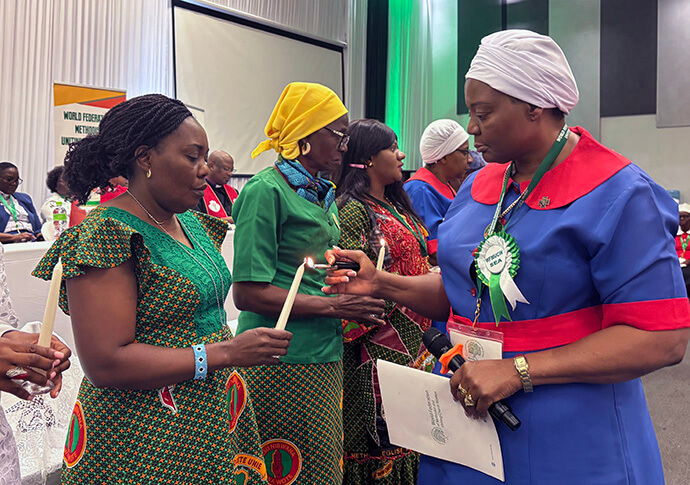
Gender-based violence dominated conversations when women from the World Federation of Methodist and Uniting Church Women gathered in Botswana’s capital April 3-6 for their quinquennial seminar.
Subscribe to our
e-newsletter
Over 600 members from the federation’s Southern and East Africa Area, all dressed in black, kicked off the gathering with a march to highlight their concern over gender violence. Representatives from 15 Methodist denominations in Congo, Burundi, Rwanda, Kenya, Tanzania, Angola, Zambia, Malawi, Namibia, Zimbabwe, Mozambique, Lesotho, Botswana and South Africa attended.
“We take this moment to raise our voices against gender-based violence,” said Patricia Mapani, a United Methodist and area president of the World Federation of Methodist and Uniting Church Women.
“This march is a symbol of our unwavering commitment to ending violence against women and girls. It is a call to action, a message to all stakeholders — governments, civil society, churches and communities — that we will not remain silent while women suffer in their homes, workplaces and societies,” she said.
“We march for justice, we march for peace, and we march for a future where gender equality is a reality. Today, we gather not just as individuals but as a united force committed to justice, dignity and the safety of all people, particularly women and girls. We march as part of our ongoing stand against GBV, a pervasive injustice that affects countless lives in our communities,” Mapani said.
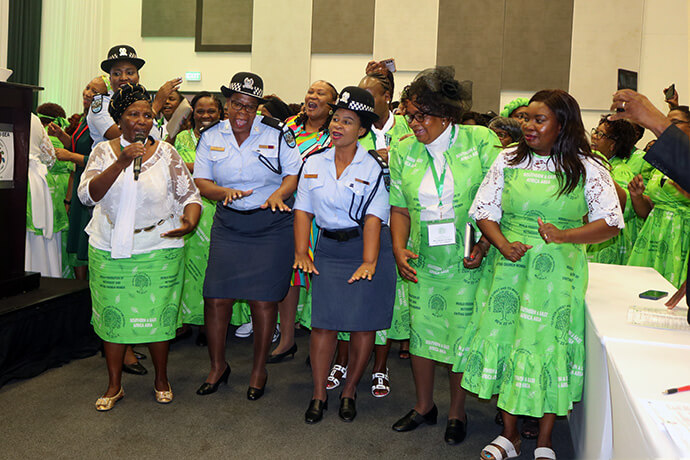
Methodist women wear black on Thursdays. The Thursdays in Black movement was started by a group of Argentinian women as a protest against oppression, domestic violence and blatant sexism by the men in their country. Methodists support the group’s belief that no one should experience any type of abuse or violence.
“We walk in solidarity with the survivors. We make a visible statement that we stand against gender-based violence and advocate for a world in which women, men and children can live in safety, free from fear and abuse. We march to remember those who have suffered in silence, and we step forward to demand change,” Mapani said.
Watch video
Hundreds of members of the World Federation of Methodist and Uniting Church Women marched in Gaborone, Botswana, to raise awareness about gender-based violence. Priscilla Muzerengwa reports for UM News.
Another gender-based violence survivor, who asked not to be named, said the experience was draining. “The violence drains your brain, passion, beauty, even the ability to look after your children. Once you see red flags, just run with your life. These abusers don’t change,” she said.
The World Bank reports gender-based violence is a significant concern in Zimbabwe, with a substantial number of women experiencing physical and sexual violence. Approximately 39.4% of women have been subjected to physical violence, and an estimated 11.6% have faced sexual violence. Although there has been a decline in child marriage rates, 16.2% of women were married before the age of 18 as of 2022.
Over 67% of women in Botswana have experienced abuse – more than double the global average, according to the United Nations Population Fund. “Gender-based violence undermines the health, dignity, security and autonomy of its victims, yet it remains shrouded in a culture of silence and normalization,” the U.N. agency reports. “Victims of violence, the majority of which are women and girls, can suffer sexual and reproductive health consequences, including forced and unwanted pregnancies, sexually transmitted infections including HIV, and even death.”
What the church says about gender-based violence
The United Methodist Church’s Book of Resolutions contains the denomination’s positions on current social issues, including sexual and gender-based violence. It urges “renewed commitment to prohibiting violence against women and children in all its forms.” There are sections on Eradicating Sexual and Gender-Based Violence, Sexual Misconduct within Ministerial Relationships and Eradication of Sexual Harassment in The United Methodist Church and Society.
Dinah Marathe, Botswana commissioner of police, described gender violence as a pandemic. “We need to go back to the drawing board for lasting solutions. Let’s come together, pray, take action and protect families as enshrined in the Bible,” she said.
Botswana’s youngest cabinet minister, Lesego Chombo, 27, who won the Miss World Africa 2024 and is Minister of Youth and Gender Affairs, expressed her concern about gender-based violence. “As women of faith, we have to stand up against violence. Globally, one in three women suffer in silence,” she said.
“Talking about gender violence is not enough. Until we see change, it must remain a priority. The job is not done until women are completely safe,” Chombo said. She added that Botswana, with a population of 2.5 million people, has only three shelters for survivors of abuse, so most people seek shelter in the church when their lives are in danger.
Africa Methodist Council general secretary the Rev. Martin Mujinga said in Africa women are socialized to protect their marriages, and this leads to them suffering in silence.
“They are told not to say anything bad about the husband. This explains why women have got more programs where they meet for fellowship, tea, clubs, societies. In all those spaces, they are able to share and discuss their issues freely while abused men cannot disclose their ordeals,” Mujinga said.
He told UM News the church should go back to its fundamentals in order to eradicate gender-based violence.
“The church should focus on the less privileged, the vulnerable and also those who are looked down upon. Jesus came for the poor, for the blind to receive their sight. His ministry was dedicated to those who were disadvantaged, and we need to live that ministry.”
Chikwanah is a UM News correspondent based in Harare, Zimbabwe.
News media contact: Julie Dwyer at (615) 742-5470 or newsdesk@umnews.org. To read more United Methodist news, subscribe to the free UM News Digests.


